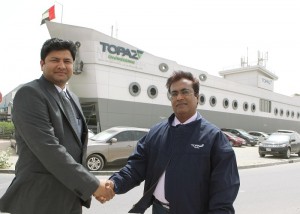 Topaz is a Dubai-based oil field services company that provides marine and engineering solutions to the global energy industry.
Topaz is a Dubai-based oil field services company that provides marine and engineering solutions to the global energy industry.
After realising the company’s work flow and employee access to critical data was not running smoothly, the 15-strong IT team identified an inconsistent bandwidth as the culprit.
It soon realised that its previous deployment of disparate firewall and VPN connectivity solutions was complex, difficult to manage and costly to scale.
This left its network vulnerable to viruses and spam attacks that caused periods of downtime and hours spent troubleshooting and fixing problems. Loss of business critical information also became an issue.
“There was the constant struggle with managing network bandwidth and security had to be addressed quickly, as the company was in a growth phase and needed to extend its network services across its growing footprint,” says Sanjay Kumar, IT Manager, Topaz Energy and Marine.
Subsequently, Kumar and his team deployed and experimented with a number of solutions on the market.
After deploying Dell SonicWall appliances as a trial in 2004, Kumar was impressed with the results and decided to engage with the vendor on a broader scale.
“Dell SonicWall had tailor-made solutions for us,” Kumar says. “It was an obvious choice because the solutions implemented would specifically address all the network problems we were facing at the time.
“Implementing the solutions would mean that our systems would always be up to date and robust. Other than helping us save the bandwidth cost and protecting us from Internet threats, other strengths included ease of use and comprehensive central management of multi-location deployments like ours. This helps us manage multiple location policies and troubleshooting by maintaining minimal downtime.”
Topaz initially deployed SonicWall’s firewall solutions in two locations, before rolling it out to all of its offices worldwide within a year. Topaz’s IT team delivers technology services to 16 office locations around the globe, including the UAE, Qatar, Bahrain, Azerbaijan, Nigeria and Brazil, all of which are connected through VPN tunnels.
Following those deployments, Topaz then upgraded to Dell SonicWall E-Class Network Security Appliance (NSA) E5500, and NSA 4500, 3500 and 2400 Next-Generation Firewalls, all of which are centrally managed at its headquarters in Dubai. It also expanded its portfolio to include Dell SonicWall ESA Email Security with 1,000 mailbox licences at its Dubai office and at its Qatar office as a back-up.
“We were especially happy with how Dell SonicWall firmware was upgraded automatically when it was released. We deployed Dell SonicWall Network Security, Email Security, and Backup and Recovery solutions, resulting in greater performance, reliability, and manageability,” Kumar says.
“Over the years, we developed a system where each office had two Internet connections – one lease line for VPN and a second line for Internet access. The lease lines piped 12 Mbps at each site, while the ADSL lines were between 40 and 100 Mbps based on local connectivity and capacity. Social media sites were blocked and rules were set based on management requirements and decisions.”
In 2008, Topaz deployed Dell SonicWall’s backup and recovery appliance Continuous Data Protection CDP 6080. Its most recent SonicWall deployment was the 2010 upgrade of its legacy firewalls to the new Dell SonicWall E-Class NSA and NSA series and E-Class Email Security Appliance 6000.
According to Kumar, the original implementation was fast and easy, and all deployments have run smoothly since.
“It took a mere few hours to be up and running – the time surpassed our expectations,” he says. “The scalable architecture of the central management system made us do the investments as and when we expanded and added more products ensuring that we only paid when the need arose and was done on the same platform without having to change any network design or interface type that we got used to.”
It was that scalable architecture and those central management solutions that allowed Topaz to keep TCO low and encouraged it to expand to experience the highest possible ROI.
Kumar is indeed happy to endorse Dell SonicWall’s claims that the complexity of its products is taken out at the engineering level, which makes the products easy to deploy and manage.
“We did not face any implementation delays and challenges as the product deployment was straight-forward and simple, as long as you have chosen the right product model for the right purpose,” he says.
The relationship between Topaz and Dell SonicWall does not end there. As with any global business, employees often work on the move at Topaz, connecting to their business-critical data through laptops, smartphones and tablets. As such, secure access and data dissemination has become paramount for Topaz’s IT executives to prevent malicious attacks and manage bandwidth.
Dell SonicWall is therefore currently working on securing the Topaz network to include mobile devices. Plans are also underway for Topaz to install Dell SonicWALL Aventail E-Class SSL VPN, which provides users of Windows, Macintosh, Linux, iOS, Android and Windows Mobile devices an “in-office” experience. This provides easier and more secure access to executives who regularly travel.
“No business is too small to neglect proper network security. The amount of data being transmitted across company networks has grown exponentially in recent years and we needed a solution to protect our rapidly growing network across the MENA region,” Kumar says.





